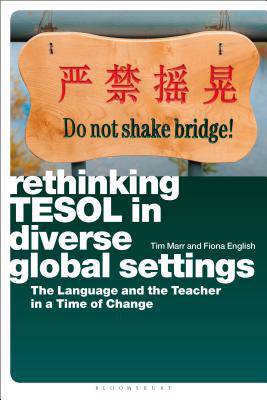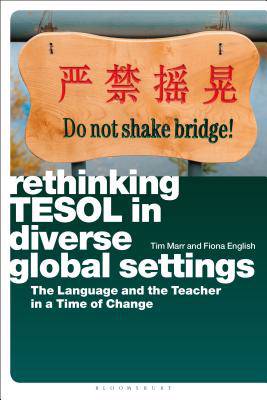
- Retrait gratuit dans votre magasin Club
- 7.000.000 titres dans notre catalogue
- Payer en toute sécurité
- Toujours un magasin près de chez vous
- Retrait gratuit dans votre magasin Club
- 7.000.0000 titres dans notre catalogue
- Payer en toute sécurité
- Toujours un magasin près de chez vous
Rethinking TESOL in Diverse Global Settings
The Language and the Teacher in a Time of Change
Tim Marr, Fiona English
Livre relié | Anglais
186,95 €
+ 373 points
Format
Description
What do TESOL teachers actually teach? What do they know about language, about English and the ways it is used in the world? How do they view themselves and their work, and how are they viewed by others? How is TESOL perceived as a profession and as a discipline? How can teachers make the most of the available resources? Can global English really deliver what it seems to promise? These are some of the questions explored in Rethinking TESOL in Diverse Global Settings, a book which examines what we mean when we talk about English language teaching and what we understand the job of an English language teacher to be.
Covering diverse teaching environments, from China to Latin America and the Middle East, and from elementary school to university, the authors take a critical look at TESOL by focusing on the actual substance of the subject, language, and attitudes towards it. Through concrete examples from language classrooms, in the form of vignettes and accounts from native speaker and non-native speaker teachers alike, they explore the experiences of teachers worldwide in relation to issues of identity and professionalism, nativeness and non-nativeness, and the pressures of dealing with the expectations with which English has become invested. While recognising the often precarious academic and institutional status of TESOL teachers, the book pulls no punches in challenging those teachers as a whole to become more ambitious in their aims, positioning themselves not as mere skills providers, but language experts, specialists in their subject, members of a legitimate academic discipline. Only then, the authors argue, will TESOL teachers and their work be taken seriously and their expertise recognised.
Covering diverse teaching environments, from China to Latin America and the Middle East, and from elementary school to university, the authors take a critical look at TESOL by focusing on the actual substance of the subject, language, and attitudes towards it. Through concrete examples from language classrooms, in the form of vignettes and accounts from native speaker and non-native speaker teachers alike, they explore the experiences of teachers worldwide in relation to issues of identity and professionalism, nativeness and non-nativeness, and the pressures of dealing with the expectations with which English has become invested. While recognising the often precarious academic and institutional status of TESOL teachers, the book pulls no punches in challenging those teachers as a whole to become more ambitious in their aims, positioning themselves not as mere skills providers, but language experts, specialists in their subject, members of a legitimate academic discipline. Only then, the authors argue, will TESOL teachers and their work be taken seriously and their expertise recognised.
Spécifications
Parties prenantes
- Auteur(s) :
- Editeur:
Contenu
- Nombre de pages :
- 272
- Langue:
- Anglais
Caractéristiques
- EAN:
- 9781350033467
- Date de parution :
- 07-02-19
- Format:
- Livre relié
- Format numérique:
- Genaaid
- Dimensions :
- 156 mm x 234 mm
- Poids :
- 557 g

Les avis
Nous publions uniquement les avis qui respectent les conditions requises. Consultez nos conditions pour les avis.






